- Home
- Richard Adams
The Day Gone By Page 26
The Day Gone By Read online
Page 26
The new academic year brings a fine crop of friends from among the freshmen scholars: William Brown, one of the classical scholars, a slim, pale, spidery Yorkshireman with a deadly wit; Mike Seale, from Fettes, a rather dashing, silk-scarf-wearing lady-killer, like Brian in Terence Rattigan’s French Without Tears: and George Revnell, known as ‘Robey’, from a fancied resemblance to the great comedian. (It’s his eyebrows, really.) Our little set has expanded to absorb the new-comers. Everything, including the academic demands of the tutors, has become rather lax, as though both work and College discipline (such as it ever was) were now felt to be somewhat irrelevant to the mainstream of life. Arthur Klingler, of course, is no longer with us. We know he was anti-Nazi, and feel sorry for him, trapped on the wrong side.
Today, fifty years later, as I write, old St Ebbe’s has gone for ever: all the area between Folly Bridge and the Botley Road has been ‘redeveloped’. No doubt this is a social change for the better, but those of us who used to frequent them will never forget those narrow lanes round the old castle, and the quiet little pubs. where Gown met Town and made friendships on Town’s home ground. The Jolly Farmers, so much frequented by us that we were often invited to play in the Aunt Sally and shove-ha’penny teams, is still there, but not Paradise Square as it was in those days. And not Billy Iles the landlord, either, or Stan Roberts the taxi-driver, or Hilda Brown the Walton Street landlady, who used to play shove-ha’penny in silk gloves.
One summer evening in 1939 Clifford Scorrer was having a quiet pint in the Aunt Sally back-yard of The Jolly Farmers when a Town friend came dashing out to say that the bulldogs were in the pub. There was one stationed outside the yard gate, too. Clifford lay down full-length under a bench against the wall, and three good ladies from among the regulars sat in front of him with their skirts spread. The bulldogs walked through the yard, but found no ‘members of this university’.
A keen night soon after Christmas of 1939. Although we don’t yet know it, we have entered upon what is going to be the great frost of early 1940 — weeks of snow and bitter cold. The stars sparkle and the east wind blows piercing sharp across the High, the Broad and the Giler.
Alasdair and I are sitting on a hearthrug, close to the fire, in the Turl Street flat of Baptista Gilliat-Smith. This is really a kind of undergraduate salon, frequented by people who like to think they are poets or artists. I have taken to coming here since some of my poems have been accepted by John Waller, a Worcester graduate who edits his own magazine, called Kingdom Come. Baptista, a freelance artist of considerable ability, designed the cover. She is sitting beside me.
There are about seven or eight people in the room, and all but two are sitting round the edges, since the gramophone is on and a rhumba is being danced in the middle. The music is exotic, repetitive, rhythmic, hypnotic. The couple are dancing apart - not embracing, as was usual in those days - but facing each other, close together, reciprocal, smiling, eyebeams intertwined.
The man is Baptista’s fiancé, George Murre, a Syrian. He is a good dancer, of striking appearance, tall, quick-footed, black-curled, olive-skinned, dark-eyed, as Mediterranean as they come. The very figure of grace and virility, he is improvising his footwork as he sways and twirls opposite his partner. It is well-known - indeed, it is at the moment plain to be seen - that Baptista is nuts about him.
His partner, pretty, dark-haired, slim, expensively dressed, getting on for thirty — quite old by our standards — is a woman so notorious in Oxford that the Vice-Chancellor has exercised, exceptionally, his statutory power to forbid her to reside within the city. Millie lives out at Marston, and has to sleep there, too. It’s about all she does do there, though. She spends all day and every evening in Oxford, often until after midnight, in the undergraduate world, moving from one casual love affair to the next. They last her three or four weeks, as a rule. Millie, herself of humble origin, once succeeded, some time ago, in getting married to a wealthy but dissolute and barmy undergraduate. Their incessant, violent quarrels, which as a rule seemed to take place in semi-public places such as the Cornmarket Hotel, led at length to a tarnished divorce and a financial settlement for Millie which has left her with more money than she really knows what to do with. What she likes is inexperienced undergraduates, but it never takes them long to discover how far she is out of her depth with people possessed of even a relatively modest intellect.
Let it not be supposed, however, that what Millie offers is sex — or at any rate anything beyond embraces and kisses. Sex hadn’t really been invented in those days. Obviously, a statement like that needs qualifying, but I cannot be bothered to do it. Anyone who lived then as an adolescent knows what I mean. Though unquenchably hopeful, undergraduates did not really expect to have sexual relations with their girl-friends.
To be perfectly candid, I think that most of us, if our bluff had been called, would have felt weak at the knees and only vaguely and theoretically knowledgeable about what we had to do - let alone about the all-important business of playing it right emotionally, of oneself feeling spontaneously the proper emotions. The whole thing was too rare, too fraught, too unfamiliar. As I have said, most people simply didn’t bother with it at all. Alasdair didn’t. ‘I’m a non-starter,’ William Brown used to say. He didn’t actually add that it made life a lot easier, but the remark implied it. To persevere, you had to be ready to be humiliated and also to be driven by an inward demon, for all the lie of the land was against you, and there was no one experienced to whom you could talk — not your parents or your tutors or your adult friends.
One bitterly cold afternoon in the Hilary term of 1940, I came back to College to find that Millie had filled my rooms with flowering mimosa. The scent of mimosa has had that association for me ever since. Like Sir Andrew Aguecheek, I was adored once, too.
I don’t think she did me any harm, beyond pleasantly wasting a lot of time. She hadn’t really the capacity to effect a grip on what you’d call a mind. She looked nice, though, and I don’t remember her ever being spiteful.
The frost went on until everything - walls, flowerbeds, fences - was like rock. Worcester lake was so hard frozen that the gardener had a job to keep a patch open for the ducks. I learned to skate. Everyone who couldn’t already skate learned to do so. There were distinct advantages. No strangers could come into the College to skate - and you can’t really conceal skates and boots - unless they had been invited and were accompanied by a member of the College. Every afternoon, the west end of Beaumont Street would get quite frequented by girls with their skates, hanging about in the hope that somebody would invite them in. Worcester men used to go out and look over the talent. The ice, of course, became crowded until the early darkness fell. Does a pretty girl ever look better than when she’s skating?
The most delightful skating, though, took place among ourselves at night, by moonlight. Four or five of us - Alasdair, Clifford, Frank Schumer, myself and one or two others - Cullen Powell, perhaps; Jim Sharp or Victor Warren - would have a couple of glasses of College port after Hall (Fonseca ’12? Graham ’20?) and then wander down with our skates to the glistening, deserted lake. The moon shone bright. We were in College: we could skate all night if we wanted to and none to say nay. Everyone else seemed to have had enough for the day, but not we. I suppose we could have ordered hot mulled claret to be brought down, but it didn’t occur to anyone. Clifford - always the sprucest of us at any time, and never more so than in his tan skating boots, plus-fours and tartan scarf - took off from among the frozen-in branches of the great, overleaning, chain-supported horse chestnut on the south bank, zipped down the length of the Provost’s garden, turned in a half-circle and came back even faster. Alasdair, in old flannel bags and converted football boots, joined him, and the two cavorted and pranced while William Brown took photographs. Soon there were half a dozen of us out on the long lake shaped like a boomerang -each arm some eighty to ninety yards long - and all across the bare gardens rang the sound of skates upon deep ice. I remember how
once we sang catches as we skated. I see Alasdair approaching, flickering in and out of the long shadows of the leafless boughs, starting ‘See, Bob, see, the play is done. Milady’s chariot, run, boy, run.’ I hear the others joining in and Clifford squealing ‘I’ve lost my watch! I’ve lost my watch!’ until, having forgotten how to bring it to an end, our voices trailed off and we came in to sit side by side close by the ilex — that very ilex from which Ariel had leapt to obey Prospero. We had health and energy enough to skate till midnight and after; until moonset, once. Then we would repair to Clifford’s rooms in the New Building and he would play us Beethoven while Alasdair made the tea. (He never really trusted anyone else to make tea.)
Why no one was ever disciplined over Alasdair’s party I have never understood. This, too, took place on a winter’s night and the secret planning was matched only by the suicidal cheek which brought the revels to an end. We decided that nothing would do for us but to have a barrel of bitter standing broached in the bedroom. And it must be illegal, of course. It never even occurred to us to enquire whether the College buttery would supply us. (I’m sure they wouldn’t have: not a barrel.) No, no; we hied away to The Jolly Farmers and propounded our scheme to Billy Iles. It all worked. We bought from him what I believe is known as ‘a pin’ or, as Billy called it, ‘four ’n ’alf’. (Thirty-six pints doesn’t sound much for a party, but we meant to have some bottled as well, and anyway, we had to tailor our prank to the smugglable size of the barrel.)
The pin fitted snugly into a sugar-crate, which was carefully fastened down and ticketed ‘Books: with Care’. Someone even found a Blackwell’s label to stick on. Then the crate was loaded into Stan Roberts’s taxi and driven by Stan his very self to the gates of Worcester.
Alasdair, in his second year, had some of the nicest rooms in College: 10:3 (the third set on Staircase 10). Immediately below lie the De Quincey rooms (the ones I had had for the scholarship exam.), from the tradition that they were occupied by Thomas De Quincey when he was up. If so, he was extremely lucky: I spent much time, both before and after the war, in negotiating with the College authorities to try to get those rooms for myself, but never succeeded. Stan Roberts, actually assisted by the suitably tipped assistant porter, carried the laden sugar-crate up to 10:3 and then left us to our own devices. We got the barrel into the bedroom, but I can’t now remember upon what we supported it: we had no proper cradle, of course, but something efficient was improvised. The spiling and tapping were carried out, and we reckoned the beer would have settled well enough by that night.
Undergraduate beer parties differ little from one another, I imagine, though perhaps, if one held in 1892 must have been rather different, at least in appearance, from one held in 1940, a similar difference might apply to one held in 1990. I don’t recall much about the early stages of the beer-up in 10:3, except that Alasdair was got up as Groucho Marx, whom he could simulate extremely well, especially with the adjuncts of a painted black moustache and an unlit cigar. ‘The Dean? Why, the first time I met him I swept him off my feet.’ His eyebrow work was particularly good. In the sitting-room was a conspicuous sign, devised by Mike Seale, pointing the way to the bedroom and reading ‘To Ye Pysse-Up: Refills’.
Now it so happened that this term the occupant of the De Quincey Room was one Dr Kiernander, a don belonging to a non-Oxford academic institution which had been evacuated to Worcester as part of the general exodus from London marking the outbreak of the phoney war. Dr Kiernander had not exactly endeared himself to Worcester - or to us, anyway - during the Michaelmas term, and as the beer flowed more freely, imaginations ranged and songs were sung, it occurred to William Brown and Jim Sharp, with natural spontaneity, that bouncing on the floor might be an effective way of reminding Dr Kiernander of the Vigornian presence vibrant above him. His name became adopted into those songs which are traditionally sung at undergraduate beer parties.
‘So, balls to Dr Kiernander, Kiernander, Kiernander,
Balls to Dr Kier nander, dirty old sod.
For he’s kept us waiting while he’s masturbating,
So balls to Dr Kier nander, dirty old sod.
The other dons, to stop his frolics;
The other dons, to stop his frolics … ‘
William’s lean, angular frame was well suited to bouncing. He spun and twirled like Ravel’s Scorbo: he seemed to be in three places at once, while the further corners of the room were kept in bouncing continuum by Alasdair, Mike Seale and myself. The lights shook and the coal fell in the fire. As people paused breathless for a rest, I felt stirred to improvise, though the tune was not mine but something of Arthur Askey’s which swam into my head.
‘Poor Kier nander, whatever can he do?
He wakes with a fright in the middle of the night
And the ceiling’s falling through.
O-oh, poor Kiernander, the noise becomes obscene.
He hurries hence in self-defence
And goes to fetch the Dean.
O-oh, poor Kiernander-’
But that, in fact, it forthwith transpired, was exactly what Dr Kiernander had done. Colonel Wilkinson, the Dean of Worcester, was suddenly among us. Voices trailed off and silence fell. We noticed that Dr Kiernander was not among those present, and we thought none the better of him for that.
The Dean paused for a short space, but all he finally came out with was ‘This party will now disperse.’ His eye then fell upon ‘To Ye Pysse-Up: Refills’. Following the direction indicated, he reached the bedroom and stood gazing at our broached pin on Alasdair’s chest-of-drawers.
‘What’s this?’
‘That, sir,’ replied Alasdair, trying to look a little less like Groucho, ‘is the cause of the trouble.’
I remember trying drunkenly to insist that the onus of any blame was equally mine, but all the Dean said was ‘Go to bed, Adams.’ I didn’t, however. We adjourned to someone else’s rooms, got hold of some more beer from somewhere and continued in a rather less unbuttoned style.
The following morning we saw our pin, now empty and bungless, lying well out on the central lawn in the quad. This turf was sacrosanct. There was a standing fine of half-a-crown for anyone observed walking on it by the porter, Sergeant-Major Bryant, ex-Grenadier Guards.
How it had got there we never discovered. Somebody went and distracted Bryant’s attention while Alasdair and I hauled the barrel off the grass and back up to his rooms. Later, we returned it to Billy Iles. As I have said, I have always been puzzled that the Dean took no further action. He must have guessed that our barrel was contraband and besides that, I wouldn’t mind betting that we must have cracked the ceiling below. Perhaps he didn’t much care for Dr Kiernander, either.
That spring we made an expedition down the underground Trill Millstream; we did. In fact, I reckon I must be one of the very few people who can have traversed the length of the Trill Millstream three times. As is widely known, the originator of this exploit was T. E. Lawrence who, when he was up at Oxford (Lincoln), decided that the stream was probably navigable and went down it successfully with a companion, a torch or two and a loaded pistol ‘in case of rats’.
I have no idea what has happened to the Trill now that old St Ebbe’s has gone and so much of south-west Oxford has been redeveloped. The topographical set-up used to be this. The Isis runs from north to south past the west flank of Worcester, under Hythe Bridge and on down to St Ebbe’s. It then makes a right-angled bend to the east and so reaches Folly Bridge and Christ Church meadows. Its course forms, in fact, an arc of ninety degrees. This arc used to have a chord, and the chord was the Trill Millstream, which ran out of the Isis into an arched brick culvert just below the north-west corner of Paradise Square, and ran eastwards underground to emerge at the south-west corner of Christ Church and thence back into the Isis. The tunnel was of arched brick all its length, and I remember it as being about five or six feet wide - the water surface, that is - and the water as fairly fast-flowing - about two or three miles an hour - and t
hree to four feet deep, with a firm bottom. It was not a sewer, but various storm culverts entered it along its length (as I shall recount). The opening at the upstream end was covered by a timber door which was in effect a top-hung hopper and not locked. You only had to pull it up to get in.
I would very much like to know what sort of craft Lawrence used. As will be told, I have good reasons for wondering. For our first expedition we took two canoes from Magdalen Bridge and paddled them upstream. William Brown and I were in one and Alasdair and Mike Seale in the other.
I am nervous by temperament, and when I was young I would sometimes, in fits of bravado, enter upon hare-brained exploits and then, later, wonder what the hell I had got myself into and why. As the wooden door swung up and we shone our torches into the pitch-black tunnel, I felt much more like going back than going on. However, no one else said anything to that effect and, having bumped and scrambled the canoes in, we began floating down.
The door swung down behind us and we were now entirely dependent for light upon our torches. Our voices echoed in the cavern. No effort was involved in going down, for we were simply drifting with the current. However, we found ourselves having to take note of two features. First, the height of the progressive sections of rounded brick tunnelling above us varied. In some places they were only about two-and-a-half or three feet above the surface of the water, while in others they were a good five or six feet. Going through the lower lengths you had to duck and stay ducked, and you couldn’t always see for how far, for there were curves. Secondly, at intervals the tunnel above water level was crossed by stout iron pipes with diameters of about five inches. These also involved ducking, while in addition several ran across so low that we had to force the canoes hard down in order to get them under.
This was what finally buggered this first expedition. I don’t know how far we’d gone down (the total length of the stream was perhaps 700 yards) when we came to an extra low pipe under which the up-curved prows of the canoes simply would not go. We got out into the water, standing waist-deep, and did all we could to force one of them under. No good. Then we even had a shot at lifting it over, but that was no good either: I’ve forgotten why; perhaps the roof was too low or the canoe was too heavy. (One of us had to hold the torches.) There was no help for it. We had to go back. Going back was, of course, harder work. We didn’t use the paddles much: we put our hands to the roof or the walls and shoved. There was nothing much to it, and eventually we re-emerged at the Paradise Square entry.

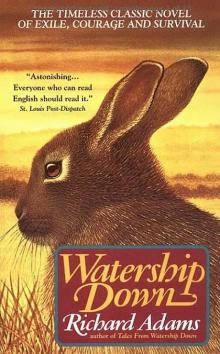 Watership Down
Watership Down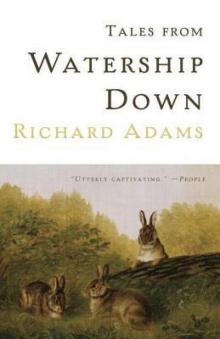 Tales From Watership Down
Tales From Watership Down Maia
Maia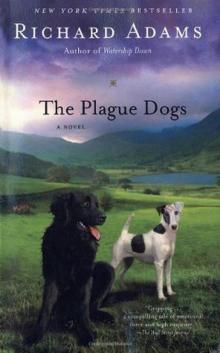 The Plague Dogs
The Plague Dogs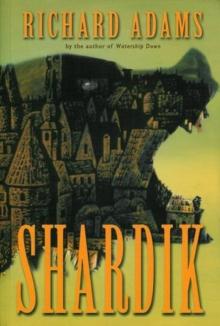 Shardik
Shardik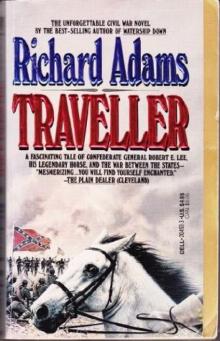 Traveller
Traveller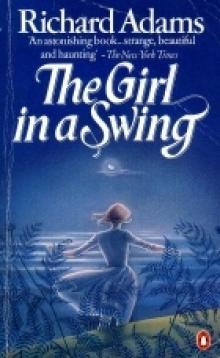 The Girl in a Swing
The Girl in a Swing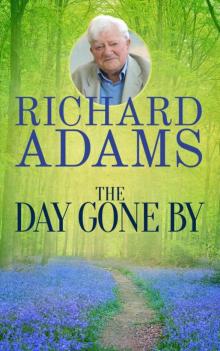 The Day Gone By
The Day Gone By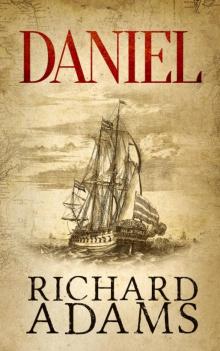 Daniel
Daniel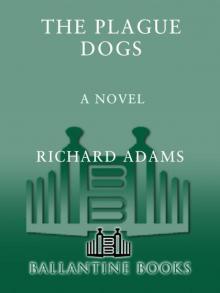 The Plague Dogs: A Novel
The Plague Dogs: A Novel